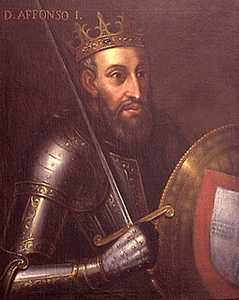 |
The Birth of Portugal |
Portugal
is the oldest State in Europe. Its history goes back to the 12th
Century, when D. Afonso Henriques declared the independence of his
Portucalense territory and installed himself as King of Portugal.
This
political break with the powerful kingdoms of León and Castile, to
which D. Henrique, father of D. Afonso Henriques, had sworn allegiance,
was the first step towards extending the borders of a small country
which at the time of its birth was located between the Minho and
Mondego rivers. Its important cities consisted of Braga - the oldest
capital of the Post-Roman kingdoms which had disputed the Christian
primateship of the Spains, along with Santiago de Compostela - Porto
and Coimbra.
The first decision of the young King D. Afonso
Henriques was where he would extend his kingdom: to the North, where
Galicia was situated, a sister land with the same culture and religion,
or to the South, a land at the time occupied by the Moors. The choice,
determined by the force of the Kingdom of León, which would not allow
itself to lose Galicia, ended up being to the South, and the first King
of Portugal conquered almost the whole of the Alentejo. In this
adventure D. Afonso Henriques had the help of the kings from the
Crusades, Christian knights from all over Europe who, with their force
of arms, helped to conquer lands from the Moors and spread the Catholic
religion.
Until the middle of the 13th century the kingdom of
Portugal was subject to geographical advances and retreats, alliances
and wars with the Moorish states of the Alentejo and the Algarve. In
1253, D. Afonso III finally managed to achieve the dream of his
great-great-grandfather and conquer Silves, the last city in the south
of the country occupied by the Moors, and thus establish the present
day borders of continental Portugal, considered as being the oldest in
Europe.
Throughout the whole Middle Ages, Portugal and the
Kingdoms of Castile and León lived in a state of permanent war,
interspersed with short periods of peace. International alliances were
extremely important at that time and made through royal weddings with
other peninsular states and with kingdoms from Northern Europe, thus
reinforcing the power of the monarchy through an alliance with the
burghers of the areas, in order to avoid the feudalisation of the
Country. The King started to govern through the courts, which contained
representatives of the three estates: Clergy, Nobility and the People.
The
conquest of the territories of the South was achieved through the
integration of Muslims and Jews, as well as the Christian populations
which had been held under Moorish control. At the same time, Portugal
developed economically, by establishing commercial relations and
exporting Mediterranean and maritime products with Northern Europe and
the Maghreb.
In the 14th century the lights of the Golden Age of
Portugal began to shine. Its language separated from
Galego-Portuguese, its court gained an intellectual brilliance to put
it on a European scale and in Coimbra it founded one of the first and
most prestigious Universities in Europe. Portugal continued to
interfere militarily and politically in the affairs of the Iberian
Peninsula, engaging in wars with its Castilian neighbour, but also
fighting, in certain cases, on its side against the common religious
enemy, the Caliphate of Cordoba and, later on, the Kingdom of
Granada.
The maritime presence of Portugal, which had already
possessed a maritime tradition prior to the founding of the State, due
to the passage through the territory of people as different as the
Greeks, Phoenicians, Romans and a countless number of peoples from the
North of Europe, started with the first maritime voyages to the Canary
Islands. It is at this time that the commercial rivalry between Lisbon
and Seville started. The romantic and tragic episode of Inęs de Castro,
which would be sung and cried over throughout Europe during the
following century, occurred in the middle of the 14th Century.
At
the end of the century Portugal was affected by the social crisis
running throughout Europe, caused by several bad agricultural years,
hunger and illnesses, amongst which the Black Plague was the deadliest,
and a political crisis let loose by a dynastic conflict and by the
danger of the loss of independence.
After a war with Castile
lasting almost two years, the crisis ended with the Portuguese victory
at the Battle of Ajubarrota and the acclamation of a new King. D. Joăo
I managed to reinforce the powers of the regions and establish an
alliance between Portugal and England - the oldest stable alliance in
Europe - through which both countries reinforced their commercial and
political ties and mutually offered each other military support.
 Portugal Past Portugal Past |
The Discoveries 
|

